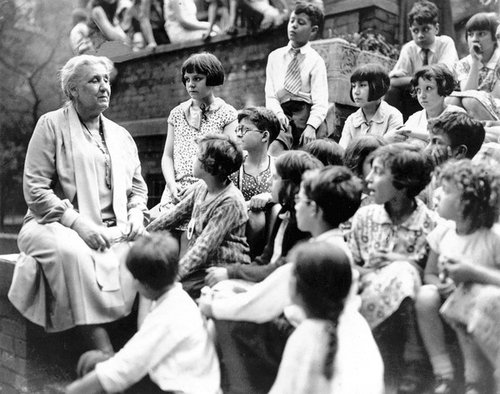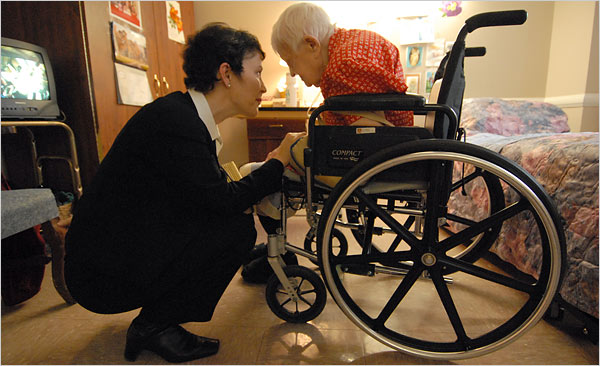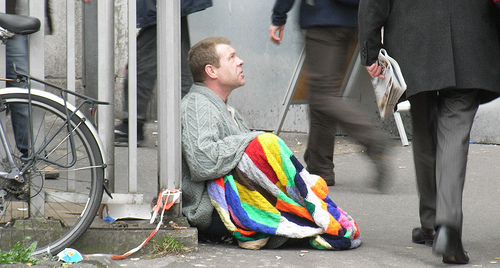These innovative Social Work initiatives, people, and moments in social work showcase the diverse nature of the profession. Social work as a profession (and science) originated in the 19th century, in conjunction with many of the social ills presented by the industrial revolution. Social work was initially developed in the United States and England, though has since spread worldwide.
Initial concerns addressed by social work included homelessness, poverty, and the inability to adapt to socially accepted or healthy values. Though the types of social work have since diversified to cover many at-risk and in-need segments of the population. Check out 25 of the most innovative initiatives, people, and moments in social work.
1. Mary Ellen Richmond

In 1917 Mary Ellen Richmond wrote Social Diagnosis which provided the foundations for modern social workers’ scientific methodology. The book built upon her lectures as well as examples from her wide readings in history, psychology, law, and the human body. Other notable acts by Mary Ellen Richmond include obtaining legislation for deserted housewives, founding the Pennsylvania Child Labor Committee, the Public Charities Association, the juvenile court, and the Housing Association. She is often referred to as the mother of social casework.
2. Jane Addams

Jane Addams started Hull House in Chicago and developed the first settlement house in a neighborhood with many European immigrants. This settlement rapidly developed into an institution offering a variety of support services for children, education for adults, culture as well as focus on healthily establishing immigrants in their new surroundings. She refused to refer to the settlement as a slum. The Hull House group professionalized contributions of women in social work and focused political advocacy in a more structural way.
3. Cognitive Therapy

Cognitive therapy is a type of psychotherapy developed by American psychiatrist Aaron Beck. It is based upon the thoughts, feelings, and behaviors that are all connected and replacing those that are difficult or unhelpful with modified beliefs and less distorted thinking. Social workers often work in conjunction with therapists to perform cognitive therapy by fleshing out the larger picture about what might be contributing to the problems faced by a patient.
4. Play Therapy

Play therapy is an important tool used generally in children aged 3-11. It is a way in which children can express their feelings and experiences in a natural, self-guided yet healing way. By nature, play is children’s vehicle for the expression of needs, problems, and experiences. Play therapy is an excellent way to work through difficulties in their world. Social work is instrumental in the acceptance and use of this important tool.
5. Music Therapy

Music therapy involves interventions using creativity, singing, moving, and/or listening to music. This innovative form of help provides ways to communicate, especially for those who may find it difficult to express themselves using words. Strengths in the client’s abilities can many times be transferred to other parts of their lives, thus proving an excellent aid.
Working through problems in life as well as overall motivation goals can be addressed. Cases in which music therapy might be successfully applied are often identified by social workers focusing on the well-being of children and have helped to gain widespread acceptance of the practice.
6. Existential Therapy

Existential therapy is based upon the existential philosophical works and is a form of psychotherapy that believes that client issues are based on inner conflicts surrounding 4 existential givens about the world around us: the inevitability of death, the responsibilities of being free, isolation, and meaninglessness. This can be used very well within the healing process, social issues, wellness and balance and has been advocated by a number of social workers, particularly when more traditional methods of healing fall short.
7. Geriatric Social Work

Geriatric social work is an innovative type of assistance for the older segment of the population focusing on preserving the quality of life of the aged by organizing a variety of services that many elderly are unable to organize for themselves.
According to the Administration on Aging, people aged 65+ represented 12.4 % of the population in 2000. This is expected to grow into 19% of the population by the year 2030. This translates to about 72.1 million older persons. This field of social work targets problems & issues that often accompany aging, their need to develop as well as to cope.
8. Crisis Intervention

The rise of crisis intervention as a concern for social workers was a very an initiative crucial to the formation of what many think of as social work today. Crisis theory provides a lens through which events that cause disequilibrium in a client’s life are due to a crisis. Through utilizing societal support nets, the community, reassurance, and counseling, social workers help clients to regain a sense of equilibrium.
9. Focus on Poverty and Homelessness

The impoverished and homeless are often the segment of society more affected by social workers. Innovation in addressing the needs of this subgroup of the population in regards to frequent hunger, lack of access to education, and inadequate clothing and shelter are frequently evolving. The social worker often builds a relationship with the client, assesses the situation, then develops goals and an action plan to meet those goals.
Many times the social worker will draw upon strengths that the individual possesses and help the client implement the action plan while utilizing resources from the community. Acquisition of new skills and appropriate counseling are many times part of the social worker’s job.
10. Marriage and Family Initiatives

Marriage and family initiatives practiced by social workers seek to preserve the essential building blocks of our broader community, economy, stability, and culture: the family unit. This aspect of social work often considers the mental health of parties within the marriage and family, looking at the broader environment, and providing actionable plans for partners and families.
11. Social Work Based on Behavioral Theories

Image Source
Initiatives in social work based upon behavioral theories is an interdisciplinary field combining psychology, medical and social sciences that are relevant to health, illness, and situational problems. Social work based upon behavioral theory is especially innovative as it can be used to help cope with physical disorders, teach healthier coping mechanisms, rehabilitation, and other social ills in society.
12. Ecological Social Work

Ecological social work is a relatively new initiative. The importance of the “person-in-environment” principle has long been recognized. Recently developed is the “environment-in-person” principle. This environment includes not only social and economic contexts but also the natural world. The reality that context is a primary determinant in the quality of life is strongly emphasized by social workers pushing this form of social work. Sustainability of solutions, as well as altering the actual environment in which we find ourselves is often emphasized.
13. Psychiatric Social Work

Psychiatric social work has risen in prominence since the beginning of the 1970s when many of the mentally ill were transferred from state hospitals and private schools into the general population. While it’s true that advances in medicine have rendered institutionalization of many unnecessary, many mentally ill still need a variety of supportive services in their life. That’s where social workers come in, assisting with supportive housing, daily living skills, transitional employment, housing, and counseling needs of the mentally ill.
14. Gang-Focused Social Work

Through their focus on a variety of support networks and subsections of the population, many social workers become exceedingly knowledgeable about the culture of organized crime and gangs. In acting on gang-related knowledge, social workers will often implement awareness programs, provide support for parents, inform community leaders, direct help and resources, and help develop policies for dealing with gangs in school systems.
15. Focus on Childhood and Family Units

Initiatives involving child and family social work are innovative and will continue to evolve with massive overhauls in education and the standards that the children of today must meet. This work provides assistance to improve the social and psychological functioning of children as well as their families. These initiatives help to maximize the well-being of the child and family, thus also interceding with school issues. They may assist parents, coordinate services for children in need, find foster homes for abandoned or abused children, and arrange adoptions.
16. Hospice Social Work

Many innovative social work initiatives have been developed focusing on grief, dying, hospice and bereavement. There is progress in showing justice, nonmaleficence (duty to cause no harm for all), tolerance of accepting all viewpoints, showing respect for all persons, confidentiality, autonomy, and confidentiality. In addition to added techniques in dealing with grief and dying, there is a great development in palliative or humane care as well as end-of-life care.
This includes complex bioethical and legal issues such as the right to refuse treatment, withholding treatment, termination of ventilator support, and physician aid in dying. Social work in many of these situations involves helping individuals and families navigate complex interdisciplinary teams.
17. Social Workers and Dealing with Children with Disabilities

Innovative initiatives involving children with disabilities have been important and substantial. If sizable decisions need to be made, particular consideration should be given to special populations. Examples of these children are those with mental illness, developmental disability, intellectual deficiency, hearing or vision disability, profound autism, language impairment, and those very ill with a limited life span.
The social work involved can gather information for resources, help provide respite care and provide individual, family, or home-based family therapy. They are also important parts of a team to help guide educational issues or those needing to be placed in a long-term care facility. Social work in this area is quickly expanding as it is best for the child, family, and society if children with disabilities can transition to productive or safe adult life.
18. Spiritual and Cultural Diversity in Social Work

The landscape of social work has changed dramatically as the need for spiritual inclusiveness has increased. Many different belief systems come about from people traveling or immigrating, therein lies the need to engage and assist this segment of society. If social worker plays an integral part in these situations, they must view the individual or family in a microcosm within their situation. They are also rapidly becoming part of interdisciplinary groups that assist the spiritually and culturally diverse population.
19. Social Workers Focus on Human Rights

The social work initiatives involving human rights are also rapidly changing. This requires innovative work based upon simple rights inherent to all human beings. This segment of social work becomes exceedingly complex with its international scope and the attached nation-centered regulations. Focal points for this form of social work include human trafficking, child labor, protection against enslavement, right to an education, protection of children, those with disabilities, and the elderly.
20. Focus on Substance Abuse

Social workers encounter individuals, families, and communities affected by substance abuse disorders. Among these social workers, there are those who specialize in alcohol, tobacco, and drugs of all sorts. This work can take place in mental health centers, hospitals, child welfare, and aging services, correctional facilities, employee assistance programs, and private settings.
Long-term assistance is many times required as these are chronic conditions. The social worker may provide services from beginning to end of assistance as well as aid in deciding when the individual re-enters society. For individuals with co-existing substance abuse disorders, social workers may be a member of interdisciplinary teams.
21. The Rise of Evidence-Based Practices

Evidence-based practice by social workers is an initiative based upon the idea of optimal behavior in a planned and systematically organized environment. Evidence-based practice is derived from ideas based on optimal behavior in a planned and systematically organized environment. This initiative means that decisions are made after reviewing repeated rigorous data rather than simply relying on rules, single observations, or what is customary, a massive shift in the development of social work methodologies.
22. Animal-Assisted Therapy in Social Work

Animal-assisted therapy (AAT) is a form of social work that involves animals as a form of treatment. While this type of assistance can take many forms, the goals are to improve the client’s social, emotional, or cognitive functioning. It is especially innovative as it tends to raise motivational effectiveness and may make a client feel less threatened. This initiative also tends to help build rapport between the social worker and client. Animals that have been used in therapy include domesticated pets, farm animals, and marine mammals (such as dolphins). Animal-assisted social work is based upon the idea that animals may signal us to safety, security, and feelings of well-being.
23. Medical Social Work

Social work initiatives involving those who have medical conditions is a burgeoning field that holds much promise. Since medical conditions affect far more than simply the body, there is a significant need for innovative assistance. Medical conditions affect emotional, financial, and social needs. Social workers may serve as case managers, patient navigators, therapists, and locators for resources in the community. The largest percentage of health care social workers are in hospital settings, while others might be in outpatient centers.
24. Alternative Medicine in Social Work

A highly innovative form of social work is known for using alternative or integrative techniques. This involves many approaches with origins outside of mainstream medicine or therapy. They are many times used in conjunction or overlapping with traditional approaches.
Examples of alternative services used by or encouraged by social workers are deep breathing, meditation, massage, yoga, progressive relaxation, guided imagery, and acupuncture. Alternative medicine changes the game for many social workers in that it allows them a much wider set of tools through which to help a client.
25. Psychotherapy and Social Work

Psychotherapy is central to some social work. Talk therapy is one of the central components of this type of therapy. It can be conducted with people of all ages as well as range in nature. It can be preventative, educational, or long-term. Social workers are sometimes able to work independently, but other times will need to be overseen by a psychiatrist or clinical psychologist.
Related:


